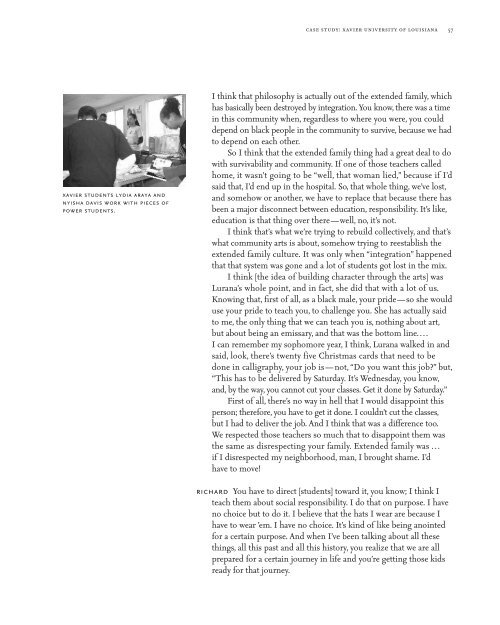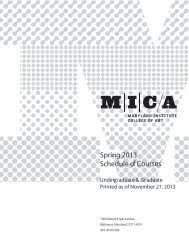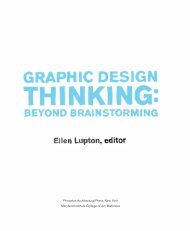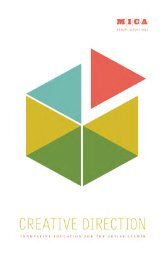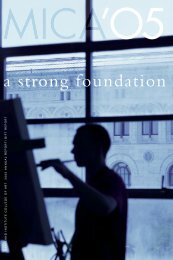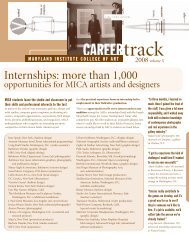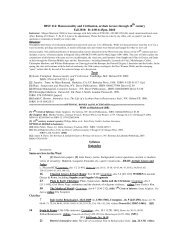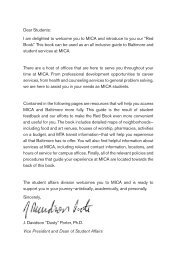art/vision/voice - Maryland Institute College of Art
art/vision/voice - Maryland Institute College of Art
art/vision/voice - Maryland Institute College of Art
Create successful ePaper yourself
Turn your PDF publications into a flip-book with our unique Google optimized e-Paper software.
xavier students lydia araya and<br />
nyisha davis work with pieces <strong>of</strong><br />
power students.<br />
case study: xavier university <strong>of</strong> louisiana 57<br />
I think that philosophy is actually out <strong>of</strong> the extended family, which<br />
has basically been destroyed by integration. You know, there was a time<br />
in this community when, regardless to where you were, you could<br />
depend on black people in the community to survive, because we had<br />
to depend on each other.<br />
So I think that the extended family thing had a great deal to do<br />
with survivability and community. If one <strong>of</strong> those teachers called<br />
home, it wasn’t going to be “well, that woman lied,” because if I’d<br />
said that, I’d end up in the hospital. So, that whole thing, we’ve lost,<br />
and somehow or another, we have to replace that because there has<br />
been a major disconnect between education, responsibility. It’s like,<br />
education is that thing over there—well, no, it’s not.<br />
I think that’s what we’re trying to rebuild collectively, and that’s<br />
what community <strong>art</strong>s is about, somehow trying to reestablish the<br />
extended family culture. It was only when “integration” happened<br />
that that system was gone and a lot <strong>of</strong> students got lost in the mix.<br />
I think [the idea <strong>of</strong> building character through the <strong>art</strong>s] was<br />
Lurana’s whole point, and in fact, she did that with a lot <strong>of</strong> us.<br />
Knowing that, first <strong>of</strong> all, as a black male, your pride—so she would<br />
use your pride to teach you, to challenge you. She has actually said<br />
to me, the only thing that we can teach you is, nothing about <strong>art</strong>,<br />
but about being an emissary, and that was the bottom line. . . .<br />
I can remember my sophomore year, I think, Lurana walked in and<br />
said, look, there’s twenty five Christmas cards that need to be<br />
done in calligraphy, your job is — not, “Do you want this job?” but,<br />
“This has to be delivered by Saturday. It’s Wednesday, you know,<br />
and, by the way, you cannot cut your classes. Get it done by Saturday.”<br />
First <strong>of</strong> all, there’s no way in hell that I would disappoint this<br />
person; therefore, you have to get it done. I couldn’t cut the classes,<br />
but I had to deliver the job. And I think that was a difference too.<br />
We respected those teachers so much that to disappoint them was<br />
the same as disrespecting your family. Extended family was . . .<br />
if I disrespected my neighborhood, man, I brought shame. I’d<br />
have to move!<br />
richard You have to direct [students] toward it, you know; I think I<br />
teach them about social responsibility. I do that on purpose. I have<br />
no choice but to do it. I believe that the hats I wear are because I<br />
have to wear ’em. I have no choice. It’s kind <strong>of</strong> like being anointed<br />
for a certain purpose. And when I’ve been talking about all these<br />
things, all this past and all this history, you realize that we are all<br />
prepared for a certain journey in life and you’re getting those kids<br />
ready for that journey.


